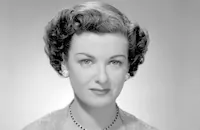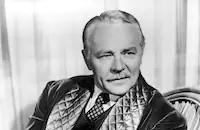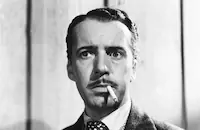The Pursuit of Happiness
Brief Synopsis
Cast & Crew
Alexander Hall
Francis Lederer
Joan Bennett
Charles Ruggles
Mary Boland
Walter Kingsford
Film Details
Technical Specs

Synopsis
At the start of the American Revolution in 1776, King George III of England arranges for ten thousand Hessians from Grand Duke Friedrich II of Hessen-Kassel to fight against the American rebels. Thus, German violinist Max Christmann is drafted against his will. On arrival in America, Max finds a note from General Washington in a pouch of tobacco promising forty acres of land to any Hessian who joins the American rebels in their fight for freedom. Impressed by the fight for independence, Max deserts and hides in the Kirkland barn in Connecticut. He is discovered, but treated well by Comfort and Aaron Kirkland's beautiful daughter, Prudence. Jealous of the presence of the handsome Hessian in his beloved Prudence's home, Thad Jennings wants to imprison Max. However, Colonel Sherwood, who is part of the Virginia Lighthouse and is under orders from General Washington, temporarily gives Max his freedom. In the meantime, Squire Banks, the self-appointed leader of the community, speaks out against bundling, a tradition in which a fully clothed couple courts by sitting in a bed separated by a center board. This long-standing tradition originated in an effort to stay warm without wasting firewood, and as far as the women of the community are concerned, the custom has been maintained with innocence and propriety. While enjoying his freedom, Max is surprised by the restrictions of the Puritan lifestyle, which seem to prevent the pursuit of happiness. This bemusement does not stop him from falling in love with Prudence, however, and she reciprocates his affection. One night she puts a candle in her window as a sign she is ready to receive her suitor. Max sneaks out from his guarded quarters and joins her, delighted with the custom of bundling. They soon are discovered, however, first by Squire Banks, and next by Thad, who presumed the candle in the window was lit for him. While Banks, Thad and Comfort protest the possible union of Prudence and Max, Aaron tries to keep the peace and make sure his daughter will be happy. Colonel Sherwood arrives and orders Thad back to his quarters, and also informs Aaron that he is to be the official recruiter of the town. Aaron's first act is to draft Banks. After Sherwood informs them that Max will be Washington's official interpreter, everyone approves his marriage to Prudence, and the couple embraces.

Director

Alexander Hall
Cast

Francis Lederer

Joan Bennett

Charles Ruggles

Mary Boland

Walter Kingsford

Minor Watson
Adrian Morris
Barbara Barondess
Duke York
Burr Caruth
Jules Cowles

Irving Bacon
Spencer Charters
John Marston
Henry Mowbray

Boyd Irwin

Holmes Herbert
Colin Tapley
Bert Sprotte
Reginald Pasch
Edward Peil Sr.
Harry Schultz
Paul Kruger
Winter Hall
Hans Von Morhart
Baron Hesse
George Billings
Ricca Allen
Tommy Bupp
Crew
Stephen Morehouse Avery
Emanuel Cohen
Bartlett Cormack
Jack Cunningham
Hans Dreier
Bernard Herzbrun
Arthur Hornblow Jr.
Harry Lindgren
Gene Markey
J. P. Mcevoy
Harry Ruskin
Ewing Scott
James Smith
Karl Struss
Virginia Van Upp
Adolph Zukor

Film Details
Technical Specs

Articles
The Pursuit of Happiness (1934)
Based on the popular Broadway stage comedy of the same name, The Pursuit of Happiness, released by Paramount in 1934, is a saucy romp whose plot revolves around the curious and titillating 18th century Puritan courtship custom of bundling. Written for the stage by husband-and-wife team Lawrence Langner and Armina Marshall (under the pen names Alan Child and Isabelle Louden) the play debuted in October of 1933 and ran until May of 1934. It was a charming and mildly scandalous hit, and was soon snapped up by Hollywood for the big screen adaptation.
Bundling, though briefly (and unsuccessfully) brought back as a rallying cry in the late 1960s by a group of chaste and concerned religious teenagers, was the often misunderstood practice whereby a man and a maiden, in days of olde, would spend the night together in the same bed, clothed, for the purpose of getting better acquainted and exploring their compatibility for marriage. Far from a furtive or clandestine move, bundling was done with the full knowledge of the parents of the girl, and in fact was encouraged as a means for young couples to learn about each other and make an intelligent match. Though it may sound too good--or too naïve--to be true, there were consequences for going beyond the bundling protocol; if a girl ended up pregnant, marriage was immediate with no other alternative considered. It was bundling, this unusual and intriguing custom in the history of romance, that provides the crux of the conflict in The Pursuit of Happiness.
Set for the most part in the bucolic Connecticut countryside at the farmstead of the Kirkland family, The Pursuit of Happiness draws upon the American Revolution for its storyline. A Hessian soldier is at the center, and if your Revolutionary history is a little shaky, all you need to know is that they were German soldiers pressed into service by Britain to fight against the colonial Americans. Anyway, this Hessian, unhappy with his involuntary servitude and learning that the rebels would gladly make his defection worth his while, escapes his regiment and hides out in the Kirkland barn. He's discovered by the family, including the comely young daughter Prudence, who's of course already engaged to straight-laced Thad, who wants the foreign deserter put behind bars. Max and Prudence are attracted to one another, and she invites him up to her room to bundle. Thad finds them together, and all hell breaketh loose when the town minister, assuming the worst, demands that the couple marry. All ends well, however, as Max ends up as General Washington's interpreter. More importantly, he and Prudence get married, enabling Max to truly understand the American ideal of the pursuit of happiness, which now is coming true for him.
Although the leading male role was first offered to Paramount's rising young talent George Raft, the actor declined the role, saying he was philosophically opposed to the practice of bundling. That opened up the way for classically-trained Czechoslovakia-born actor Francis Lederer to step into the dashing role of Hessian runaway Max, opposite the lovely young actress Joan Bennett, who came from a theatrical family and began her movie career at the age of six.
The darkly handsome Lederer had been a top stage star in Europe, touring throughout the region and eventually establishing a huge following in Berlin, where he was particularly beloved for his leading role in director Max Reinhardt's production of Romeo and Juliet as well as for his singing and dancing talent in musicals. Lederer began making films around the end of the 1920s, including Pandora's Box (1929), directed by G.W. Pabst, opposite American acting legend Louise Brooks. Although offers to come to Hollywood soon followed, Lederer had not learned English at this time and so continued in European productions but eventually felt confident enough to try his hand on the English stage. His mastery of the English language grew and in 1932 he tackled Broadway, and then moved into Hollywood films, including his starring role in The Pursuit of Happiness.
The supporting cast of the movie was filled with veteran character actors, including as Prudence's father Charlie Ruggles, who had been appearing in films since the mid-teens and was by 1934 a veteran of over forty films, and who would go on to make a hundred more before his final movie in 1968. Her mother was played by Mary Boland, who had also made her debut in early silent pictures and was an accomplished light comedienne as well as dramatic actress. The outraged Rev. Banks was Walter Kingsford, a British actor who would amass a resume of over one hundred and thirty roles during his thirty-year career. Prudence's fiancé Thad was played by Adrian Morris, the brother of star Chester Morris. Adrian made over forty films during his barely ten year career which ended with his sudden and unexpected death in 1941.
The Pursuit of Happiness was directed by Alexander Hall, a Hollywood veteran who had started out as a child stage actor, then branched out into editing and direction in silent films. During the early 1930s he worked primarily at Paramount, helming a variety of pictures including the 1934 Shirley Temple feature Little Miss Marker and Goin' to Town, starring the sultry Mae West, in 1935. He directed his last movie in 1956, the Lucille Ball/Desi Arnaz comedy Forever, Darling.
In preparation for the release of The Pursuit of Happiness, the Paramount publicity department didn't shy away from the racier elements of the film's plot. They touted it in studio press materials as "The Bundling Hit" and used a comparison chart --1776, Bundling; 1823, Tarrying; 1875, Snuggling; 1901, Sparking, 1934, Necking -- to illustrate the timelessness of the story's appeal. Though times have certainly changed, the charm and playful naughtiness that made The Pursuit of Happiness a hit on Broadway came through in the movie which is still enjoyable today. Especially noteworthy is the setting itself, the American Colonial period, a time in our country's history which has been given short shrift over the years in Hollywood but which is delightfully captured here.
Producer: Arthur Hornblow, Jr., Emanuel Cohen
Director: Alexander Hall
Screenplay: Stephen Morehouse Avery, J.P. McEvoy, Virginia Van Upp, Armina Marshall Langner (play), Lawrence Langner (play)
Cinematography: Karl Struss
Film Editing: James Smith
Art Direction: Hans Dreier, Bernard Herzbrun
Music: Heinz Roemheld, Tom Satterfield
Cast: Francis Lederer (Max Christmann), Joan Bennett (Prudence Kirkland), Charles Ruggles (Aaron Kirkland), Mary Boland (Comfort Kirkland), Walter Kingsford (Rev. Lyman Banks), Minor Watson (Col. Sherwood).
BW-85m.
by Lisa Mateas

The Pursuit of Happiness (1934)
Quotes
Trivia
Notes
News items in Daily Variety reveal that Ralph Murphy was originally slated to direct, but was forced out by illness. A Daily Variety news item noted that the PCA required eliminations from the script and, "with picture now in production, company has little left of the yarn except the title." According to the film's pressbook, some scenes were filmed in the Hollywood Hills and at the Paramount Ranch in California.














